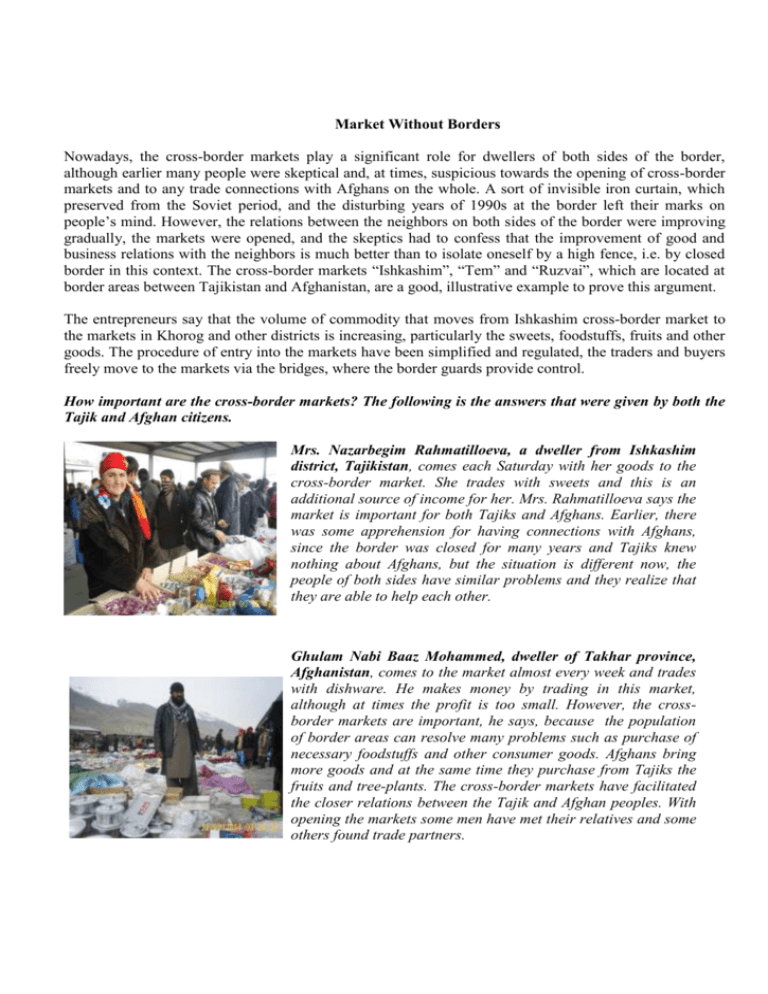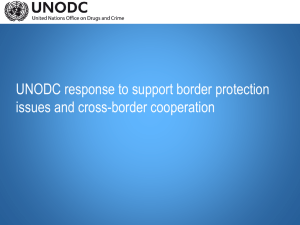bomca iskashim
advertisement

Market Without Borders Nowadays, the cross-border markets play a significant role for dwellers of both sides of the border, although earlier many people were skeptical and, at times, suspicious towards the opening of cross-border markets and to any trade connections with Afghans on the whole. A sort of invisible iron curtain, which preserved from the Soviet period, and the disturbing years of 1990s at the border left their marks on people’s mind. However, the relations between the neighbors on both sides of the border were improving gradually, the markets were opened, and the skeptics had to confess that the improvement of good and business relations with the neighbors is much better than to isolate oneself by a high fence, i.e. by closed border in this context. The cross-border markets “Ishkashim”, “Tem” and “Ruzvai”, which are located at border areas between Tajikistan and Afghanistan, are a good, illustrative example to prove this argument. The entrepreneurs say that the volume of commodity that moves from Ishkashim cross-border market to the markets in Khorog and other districts is increasing, particularly the sweets, foodstuffs, fruits and other goods. The procedure of entry into the markets have been simplified and regulated, the traders and buyers freely move to the markets via the bridges, where the border guards provide control. How important are the cross-border markets? The following is the answers that were given by both the Tajik and Afghan citizens. Mrs. Nazarbegim Rahmatilloeva, a dweller from Ishkashim district, Tajikistan, comes each Saturday with her goods to the cross-border market. She trades with sweets and this is an additional source of income for her. Mrs. Rahmatilloeva says the market is important for both Tajiks and Afghans. Earlier, there was some apprehension for having connections with Afghans, since the border was closed for many years and Tajiks knew nothing about Afghans, but the situation is different now, the people of both sides have similar problems and they realize that they are able to help each other. Ghulam Nabi Baaz Mohammed, dweller of Takhar province, Afghanistan, comes to the market almost every week and trades with dishware. He makes money by trading in this market, although at times the profit is too small. However, the crossborder markets are important, he says, because the population of border areas can resolve many problems such as purchase of necessary foodstuffs and other consumer goods. Afghans bring more goods and at the same time they purchase from Tajiks the fruits and tree-plants. The cross-border markets have facilitated the closer relations between the Tajik and Afghan peoples. With opening the markets some men have met their relatives and some others found trade partners. Obaidollah waladi Dingul, a dweller of Kabul, a trader of fabrics and clothes, trades at the cross-border market since its opening. He says the cross-border markets are important for both Tajiks and Afghans, and in future their importance will be increasing. In this regard, he expressed his wish that the functioning of the cross-border markets never be suspended. Mansour Mansourov, a dweller of Ishkashim district, Tajikistan, a trader of national robes, said that lately he had frequently come to the cross-border market to trade his goods. He received a loan from a bank, and now he sells national robes, which have a good demand among Afghans. Owing to the sale of robes, he is able to repay the loan. There are many young people who work at the markets. Owing to the cross-border markets the youngsters start up their own businesses. They come from various villages of Ishkashim district or even from Khorog, purchase goods in cross-border market and sell them in their villages. If there were no such market, they would migrate abroad to earn a living. Earlier, the youth from remote villages consider the migration as the only way to earn money and survive, but now many people are carrying out entrepreneurial activities owing to these cross-border markets. And, indeed, the Regional Department of the Agency on Social Protection, Employment and Migration confirms what the entrepreneurs say. As it was clarified, 3,239 residents of Ishkashim district are currently in labor migration. In Gorno Badakhshan Autonomous Region on the whole the number of labor migrants reaches 24,000. According to the Regional Department of the Agency, the growth of labor migration has not been noticed in Ishkashim district over the last few years. The Regional Department’s specialists believe that the main reason why the labor migration growth has stopped is that new opportunities emerged for population of the district, and one of such opportunities is the entrepreneurship in the crossborder markets. The officers in the Border Crossing Points, who ensure order in the cross-border markets, also shared their own views on how important the cross-border markets are for population on both sides of the border, whether there are problems with admittance of people into the markets, how these problems are resolved and how the Tajik and Afghan border guards coordinate their actions on the whole. Abdul Haleq Mamad Alem, Commander of BCP on Afghan side says: “The cross-border market have made the people from both sides much closer to each other. Now there are no any problems with permission of people to enter the market. The number of traders increases each year, and the market helps people meet their needs. We resolve any problems jointly with our Tajik colleagues, and we have established very good cooperation. The market is important for people, and we try to facilitate them. Moreover, we have a good experience, and the traders themselves already know all rules and procedures, and that is why no any serious problems have emerged so far. Together with our Tajik colleagues we try to prevent the smuggling of forbidden goods, but fortunately such cases are very rare. The opening of cross-border markets became possible mainly due to the improved border protection. Now, on both sides the border guards can provide joint control over movement of people. I think this will further facilitate the growth of the market. A representative of the BCP on Tajik side noted that the relations are really improving due to the established order on the border. He said, earlier both Afghan and Tajik border guards had very limited possibilities to ensure border protection. The border was practically open, the smuggling was flourishing, the border outposts were just surviving. Later, the conditions for staff improved, new border outposts were built, the border crossing points were refurbished and brought to their normal working conditions. When the order was re-established on the border, it allowed these cross-border markets be opened. Initially there was some apprehension that these markets could serve as a convenient platform for smugglers, but this did not happen. Owing to the joint efforts of the Tajik and Afghan border guards, the crossborder markets are serving not to individual persons, but to all ordinary people. On the basis of all the aforementioned, we can come to conclusion that the cross-border markets have played a very positive role in making the people from both sides of the border closer to each other. These markets enable people to buy and sell goods and, through this, improve their lives. At this stage of development we can say with confidence that the approachment of the two peoples has adopted diplomatic, economic and cultural character. The Afghan villages are connected to the power transmission lines, which come from Tajikistan, many Tajik specialists are working in various provinces in Afghanistan, popular Tajik singers give concerts in Afghan cities, there are agreements on transfer of water from mountain rivulets to territory of Afghanistan for irrigation of lands, the law enforcement agencies have established cooperation on border security, etc. As they say in the East, “a good neighbor is closer than a relative”, and this proverb finds its reflection on the example of the improving friendly relations between Afghanistan and Tajikistan. А. Mardonov








